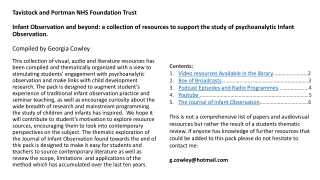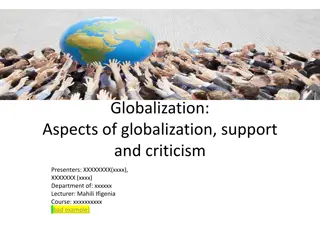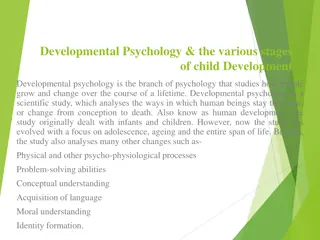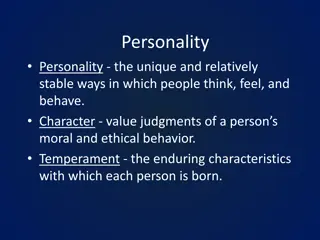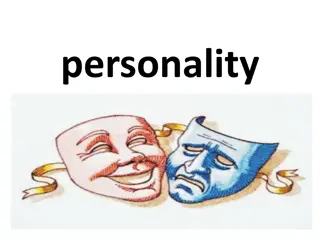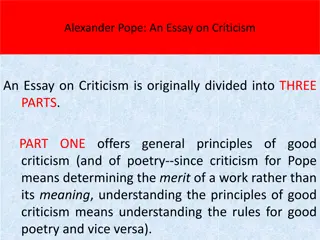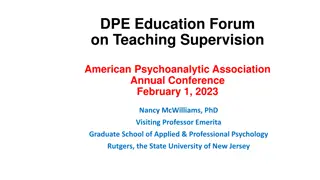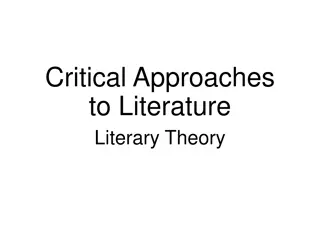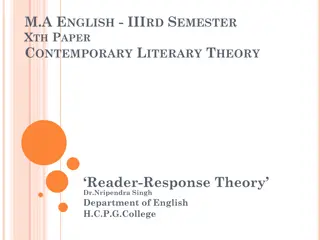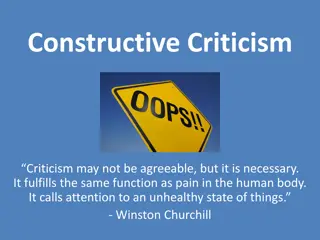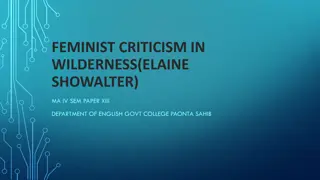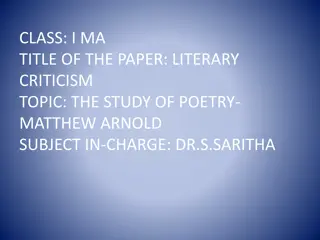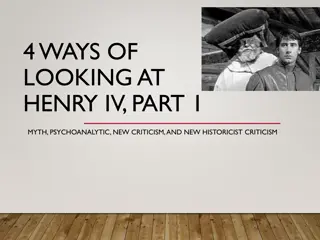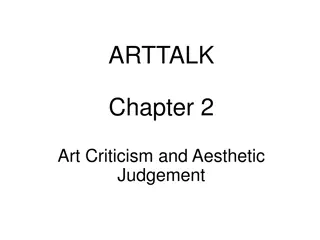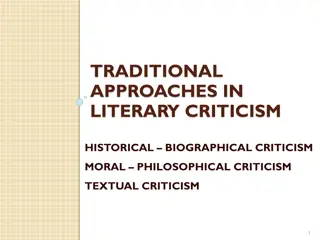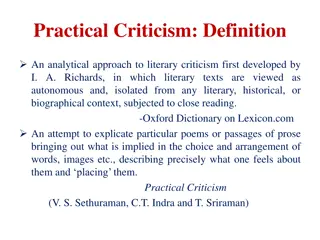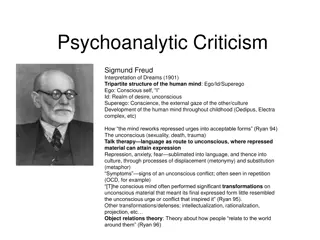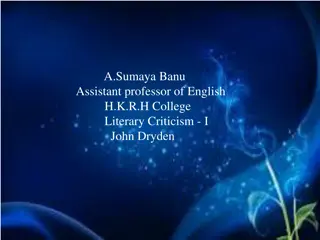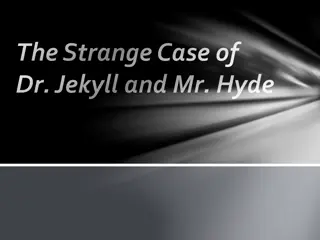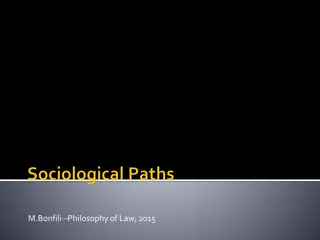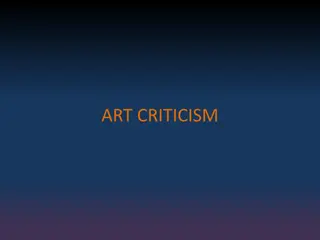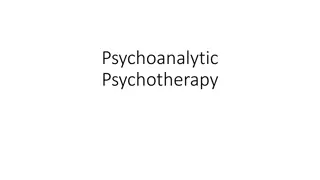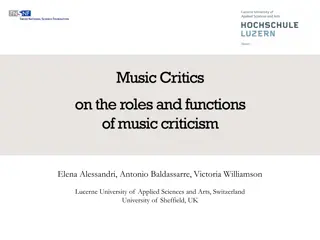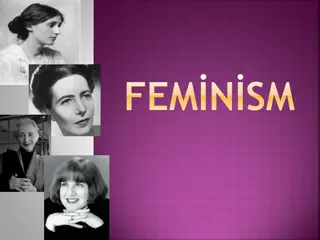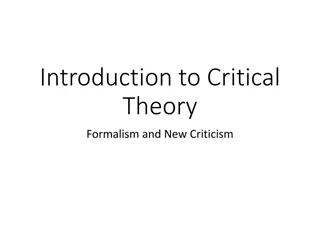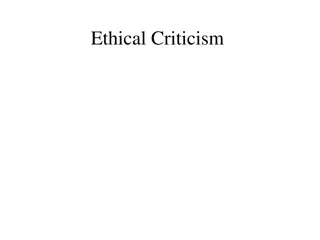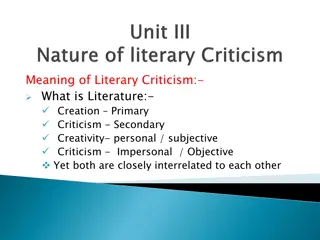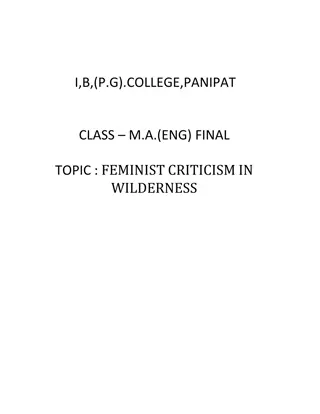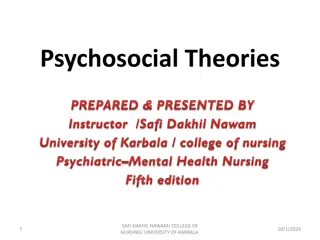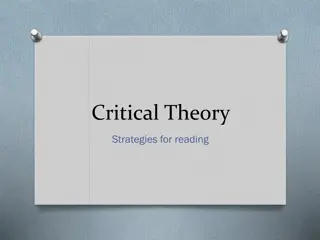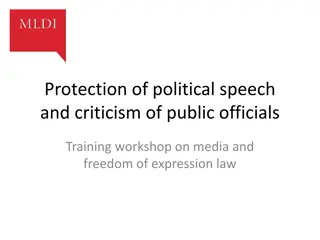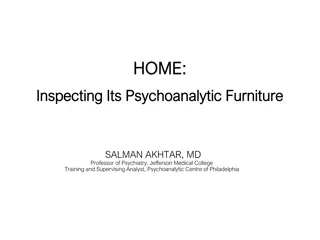Exploring Psychoanalytic Infant Observation: A Resource Collection
Discover a curated collection of visual, audio, and literature resources compiled to enhance the study of psychoanalytic infant observation and its relation to child development. This resource pack aims to engage students with contemporary perspectives, encourage exploration of research sources, and
0 views • 33 slides
Understanding Globalization: Aspects, Support, and Criticism
Globalization encompasses various aspects such as international integration, advances in transportation and telecommunications, interdependence of cultural and economic activities. The term has been widely used since the mid-1980s, leading to both support and criticism. While economic globalization
3 views • 25 slides
Understanding Developmental Psychology: Various Stages of Human Development
Developmental psychology is a scientific study analyzing how individuals evolve from infancy to old age. It encompasses physical and psychological processes, problem-solving, language acquisition, moral understanding, and identity formation. Major theories like psychoanalytic, behavioristic, and cog
0 views • 10 slides
Understanding Personality: Freud's Psychoanalytic Theory
Personality encompasses unique ways individuals think, feel, and behave. Sigmund Freud's psychoanalytic theory explores the divisions of consciousness, parts of personality (Id, Ego, Superego), and stages of personality development. Freud's theory delves into the role of unconscious thoughts, desire
3 views • 41 slides
Understanding Personality: Theories and Components Explained
Personality is the unique and enduring characteristics that define individuals, influencing their behavior consistently over time. Explore the origins of personality from the Latin word 'persona' meaning 'mask', and delve into major perspectives such as psychoanalytic, trait, humanistic, and social-
1 views • 45 slides
Overview of Alexander Pope's "An Essay on Criticism
Alexander Pope's "An Essay on Criticism" is divided into three parts discussing the principles of good criticism, offering solutions to critical problems, and identifying obstacles to good criticism. Part One delves into the challenges critics face due to partial judgments, false learning, and envy.
0 views • 17 slides
Psychoanalytic Supervision: Integrative Approach and Practical Guidance
This comprehensive overview by Nancy McWilliams, PhD, explores various aspects of mental health supervision, including different styles of supervision, ethical considerations, and individual differences. She addresses the historical context, psychological evaluation in treatment progress, and the im
3 views • 62 slides
Understanding Psychological Theories of Criminal Behavior
Psychologically-based criminologists attribute criminal behavior to individual factors such as negative early childhood experiences and inadequate socialization, leading to criminal thinking patterns and incomplete cognitive development. Probation and parole practices are influenced by rehabilitatio
0 views • 30 slides
Understanding Dreams: Exploring Theories and Meanings
Dreams have intrigued philosophers for centuries, with recent scientific research shedding light on their significance. While the purpose of dreams remains debated, various theories like Freud's psychoanalytic perspective offer insights into how dreams may be linked to our subconscious desires and t
0 views • 9 slides
Critical Approaches to Literature and Literary Theory
Explore different critical approaches to studying literature, including Reader-Response Criticism, Formalist Criticism, Psychological/Psychoanalytic Criticism, Sociological Criticism, and more. Dive into questions of how we read, interpret, and perceive meaning in texts, considering the impact of vi
1 views • 20 slides
Understanding Reader-Response Theory in Literary Criticism
Reader-response criticism in literary theory emphasizes the reader's role in interpreting and creating meaning from a literary work. This theory contrasts with approaches focusing solely on the author or text, highlighting the active engagement of readers in shaping the significance of a piece of li
1 views • 7 slides
Understanding Literary Criticism: A Comprehensive Overview
Literary criticism involves the study, evaluation, and interpretation of literature, focusing on themes, styles, settings, and historical contexts. This discipline explores the meanings, workings, and values of literary works through interpretation, analysis, and evaluation. Various types of literar
2 views • 20 slides
Understanding Constructive Criticism in College
Constructive criticism plays a vital role in personal growth and development. It distinguishes between constructive and destructive feedback, highlighting the intent behind criticism and its significance in college settings. Embracing feedback positively can enhance one's learning experience and aca
1 views • 13 slides
Feminist Criticism in the Wilderness by Elaine Showalter - Analysis
Elaine Showalter's essay "Feminist Criticism in the Wilderness" delves into the realm of feminist literary critique, addressing the diversity among women writers and emphasizing the importance of considering factors beyond gender. Showalter highlights the challenges and goals of feminist criticism w
0 views • 13 slides
Matthew Arnold's Literary Criticism: The Study of Poetry
Explore Matthew Arnold's approach to literary criticism focusing on the study of poetry. Arnold's work as a critic of literature, society, and religion is discussed, emphasizing his three estimates of poetry - the Real Estimate, the Historic Estimate, and the Personal Estimate. The Real Estimate hig
0 views • 9 slides
Exploring Different Perspectives on Henry IV, Part 1 Through Myth, Psychoanalytic, New Criticism, and New Historicist Criticism
Delve into various critical lenses such as myth, psychoanalytic, New Criticism, and New Historicist Criticism to analyze Henry IV, Part 1. Uncover the mythic origins of characters like Falstaff, connections to ancient rituals, and the symbolism of killing the king. Discover how literature intertwine
4 views • 26 slides
Understanding Art Criticism and Aesthetic Judgement
Explore the world of art criticism and aesthetic judgement in Chapter 2 of ARTTALK. Discover the purpose of art criticism, learn to critique art, and understand aesthetic theories. Dive into the realm of professional critics, criteria for judgement, and the importance of forming your own opinions in
0 views • 38 slides
Traditional Approaches in Literary Criticism: An Overview
Literary studies in the early 20th century were influenced by traditional approaches like historical, biographical, moral, philosophical, and textual criticism. These approaches focus on external information to interpret literary works, connecting them to broader contexts in fields such as history,
0 views • 32 slides
Exploring Critical Theory Through Literary Criticism and Analogy
Delve into the realm of critical theory through literary criticism, using the analogy of different perspectives on seeing an orange to understand the various facets of analysis like reader response, Marxist/social power, feminist/gender, and psychoanalytic criticism. Discover how critical theory hel
0 views • 9 slides
Practical Criticism: Analysis and Appreciation of Poetry and Prose
Delve into the world of practical criticism and critical appreciation in BA III English studies with a focus on analyzing and appreciating poetry and prose. Explore the history, significance, and methodology behind this literary practice while gaining insights into interpreting unseen poems. Discove
3 views • 20 slides
Understanding Social Anxiety and Avoidant Behaviors
Social anxiety involves intense fear and avoidance of social situations, leading to catastrophic thinking and physiological reactions like performance anxiety. Individuals may anticipate criticism, rejection, or embarrassment, which can interfere with their functioning. This condition can manifest a
3 views • 30 slides
Understanding Practical Criticism in Literary Analysis
Analysis of Practical Criticism, an approach developed by I.A. Richards, involves close examination of literary texts without historical or biographical context. It aims to encourage students to respond to poetry and literature by focusing on form and meaning, identifying sources of pleasure. The pr
0 views • 16 slides
Overview of Psychoanalytic Criticism and Object Relations Theory
Psychoanalytic Criticism, originating with Sigmund Freud and further developed by Melanie Klein and Jacques Lacan, explores the intricate workings of the human mind, delving into the tripartite structure of the ego, id, and superego. The theory encompasses concepts such as the interpretation of drea
0 views • 10 slides
John Dryden's Literary Criticism and Works
A look into the literary criticism and works of John Dryden, focusing on his formal treatises, advocacy of the heroic couplet, defense of rhymed couplets in tragedy, and discussions on poetry and painting. Dryden's writings encompass a variety of genres and styles, from dramatic criticism to epic po
0 views • 23 slides
Insights into "The Strange Case of Dr. Jekyll and Mr. Hyde" by Robert Louis Stevenson
Explore the intriguing background and themes behind Robert Louis Stevenson's famous novella, including the duality of human nature, Victorian England's societal norms, and the influence of contemporary ideas such as Charles Darwin's theory of evolution and Sigmund Freud's psychoanalytic concepts. Di
0 views • 10 slides
Matthew Arnold's Impact on Literary Criticism and Poetry Evaluation
Matthew Arnold, a prominent Victorian poet and critic, revolutionized literary criticism by emphasizing the importance of knowing and promoting the best ideas in the world through critical evaluation. He introduced scientific objectivity to criticism and influenced a generation of critics. Arnold sa
0 views • 25 slides
Understanding Gender Socialization Theories and Impact on Identity Formation
The discussion delves into the criticism of naturalistic paradigms in understanding gender identity, emphasizing the societal role in shaping individual perceptions. It explores three theories of gender socialization - Psychoanalytic theory, Social learning theory, and Cognitive developmental theory
0 views • 62 slides
Understanding Art Criticism: A Comprehensive Guide
Delve into the realm of art criticism to grasp the essence of responding to, interpreting, and making critical judgments about artworks. Explore the steps of art criticism, from description to judgment, and learn how to analyze artworks in terms of elements and principles of art and design.
0 views • 17 slides
Understanding Psychoanalytic Psychotherapy
Psychoanalytic psychotherapy aims to increase adaptive functioning by reducing symptoms, resolving conflicts, and fostering self-reflection. The therapy involves making the unconscious conscious, strengthening the ego, and exploring childhood experiences to increase self-awareness. Therapists mainta
0 views • 63 slides
Russian Formalism and American New Criticism Overview
Russian Formalism, a literary movement that emerged in the early 20th century, was a radical departure from traditional approaches to literary analysis. It sought to define literary criticism as a scientific profession, focusing on the autonomy of literature and employing linguistics for support. Th
0 views • 22 slides
Roles and Functions of Music Criticism: Insights from Researchers
Exploring the various aspects of music criticism, this study delves into the role of critics in evaluating music performance, their criteria for assessment, and the impact of their reviews. Researchers interviewed English and German-speaking critics to gain insights into their perspectives and pract
0 views • 20 slides
Evolution of Feminist Literary Criticism: Challenging Patriarchal Ideals Through History
Feminist literary criticism challenges historical patriarchal views in literature from ancient Greek beliefs to modern writings. The roots of prejudice against women have been deeply embedded in Western culture, with notable works like Mary Wollstonecraft's "A Vindication of the Rights of Women" pio
0 views • 42 slides
Understanding Literary Criticism: Formalism and New Criticism
Literary critics analyze and interpret works of literature, delving into social and historical contexts. They focus on techniques, themes, and cross-disciplinary exploration. Formalism, a critical lens, emphasizes internal elements of a text over external influences, seeking universal meanings expre
0 views • 11 slides
Exploring Ethical Criticism and Literature's Human Possibilities
Ethical criticism in literary studies revolves around the intersection of ethics, literature, and criticism. It tackles concerns about the relationship between value judgments, ethics, and aesthetics, emphasizing the importance of reconnecting criticism with moral principles. Literature offers a dee
0 views • 21 slides
Understanding Literary Criticism: Exploring the Art of Interpreting and Evaluating Literature
Literary criticism, rooted in ancient Greek and Roman traditions, involves interpreting, analyzing, and evaluating literary works. It has evolved over time, encompassing various theories and approaches to engage with literature critically. From mimetic theory to analytical criticism, different persp
0 views • 11 slides
Feminist Criticism in Wilderness: Analyzing Elaine Showalter's Essay
The essay by Elaine Showalter delves into feminist literary criticism, exploring its aims, challenges, and the perception of being in "wilderness." Showalter discusses the evolution of feminist criticism, the need for a solid theoretical framework, and the hurdles faced by feminist critics. She emph
0 views • 14 slides
Overview of Psychoanalytic Theories in Psychiatric Mental Health Nursing
Explore the fundamental beliefs and treatment modalities of psychosocial theories such as psychoanalytic, developmental, behavioral, existential, and crisis intervention. Learn about the influence of these theories on current nursing practices, with a focus on the foundational contributions of Sigmu
0 views • 40 slides
Exploring Critical Theory Strategies in Literary Analysis
Delve into the diverse approaches of Critical Theory to interpret and analyze literary works with new lenses. From Formalist and Biographical Criticism to Historical and Marxist perspectives, uncover hidden layers and meanings in texts through multiple viewpoints. Explore the role of psychoanalytic
0 views • 24 slides
Protection of Political Speech and Criticism: Ensuring Freedom of Expression for Public Officials
Understanding the importance of freedom of speech in political discourse, this workshop focuses on the legal framework protecting political speech and criticism of public officials. Highlighting the rights and responsibilities in democratic societies, the content emphasizes the necessity of open deb
0 views • 14 slides
Reflections on the Significance of Home in Psychoanalytic Theory
Explore the intricate connections between the concept of 'home' and psychological well-being through the lens of psychoanalytic theory. From Freud's views on the symbolic nature of home to Winnicott's emphasis on the role of the environment in shaping one's sense of security, delve into the profound
0 views • 10 slides
